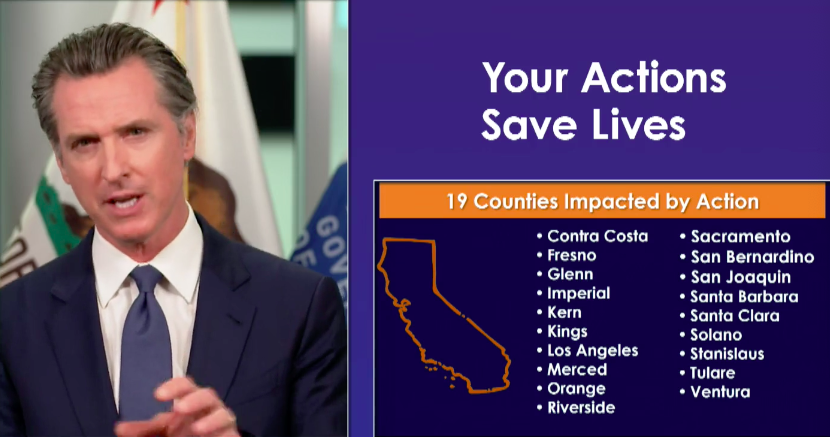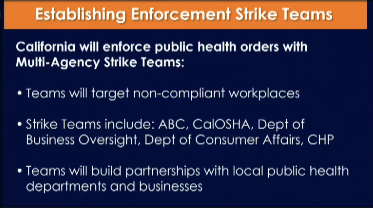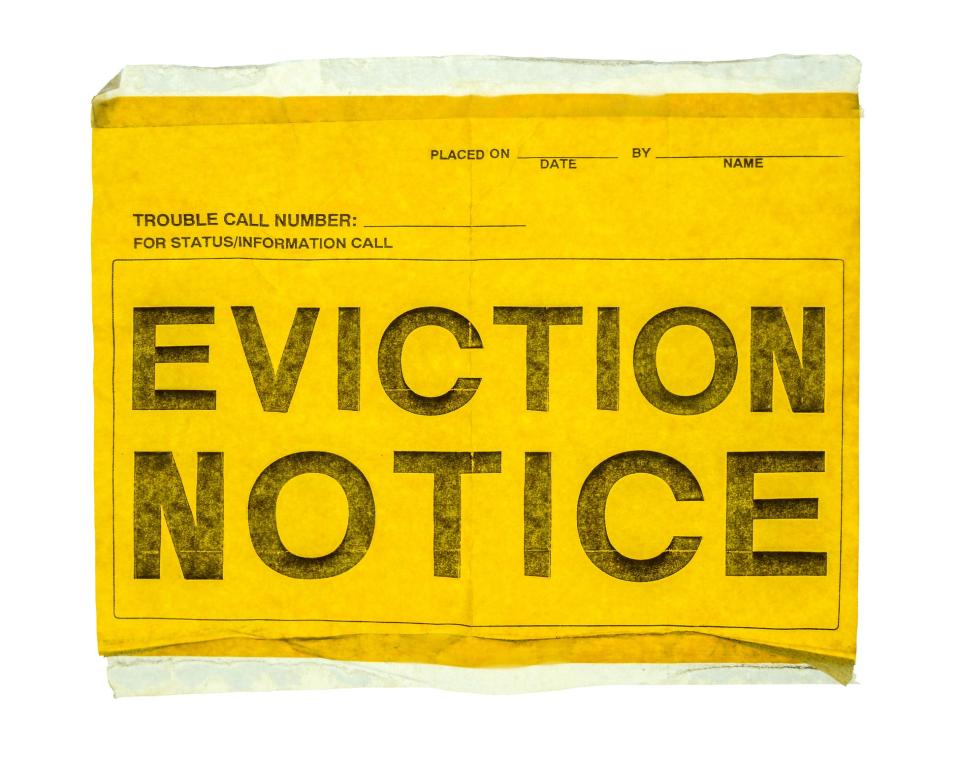In CA: Consumer Privacy Act goes into full effect and much of the state shuts back down

Gov. Newsom orders most indoor business activities to close across much of the state as coronavirus cases continue a swift ascent. And let's revisit the nation's most comprehensive data privacy law that went into effect in the Golden State on Jan. 1, but now, can actually be enforced.
It's Arlene Martínez with news for Wednesday.
But first, United Airlines is adding 25,000 flights to its August schedule (video). Just know some of your destinations will require you to quarantine once you get there (more on that later👇🏾 ).
In California brings you top stories and commentary from across the USA TODAY Network and beyond. Get it free, straight to your inbox and tell a friend.
Shutting back down as cases climb back up

To help stifle an alarmingly fast-growing number of coronavirus cases and hospitalizations, Gov. Gavin Newsom on Wednesday ordered a variety of indoor activities to shut down across 19 counties.
The list includes restaurants, wineries, movie theaters, zoos, museums and card rooms. The order became effective immediately to get ahead of Fourth of July crowds and will be in place for at least three weeks.
More than 70% of the state's population lives in the impacted counties.
“This doesn’t mean restaurants shut down,” Newsom said. “It means we’re trying to take activities, as many activities as we can, these mixed activities, and move them outdoors, which is a way of mitigating the spread of this virus."
► Stay in the know on all things Golden State: Our California newsletter is here
But outside spots too are closing across California. State beach parking facilities will close in SoCal and the Bay Area, and so will accompanying beaches in counties where local officials have ordered closures.
Ventura County will close all of its beaches starting at 5 a.m. Friday, following the lead of neighboring Los Angeles County, which earlier this week announced it's doing the same.
Want to carry on like normal? There's a strike team for that

Newsom urged residents and business owners to comply with the state mandates to close and to wear masks if they went out. He said he "deeply" respected people's liberties but a person's actions impacted those around them.
Holiday gatherings should be avoided, he said, and the threat is far from over: "Please do not take your guard down."
But should you want to open anyway, there will be ramifications, Newsom said. "Strike teams" will target non-compliant workplaces, especially if there have been abuses or complaints in the past.
The effort will start with education but could include regulatory and fiscal penalties, he said, including a $2.5 billion state allocation to counties that could be held back if they don't comply with health directives.
A man who went to a June party in Riverside County later posted on Facebook he regretted going. A day later, he died from COVID-19.
Transferring the virus, eviction protections, a UCB suit and ignored complaints
A coronavirus outbreak at San Quentin State Prison stemmed from prisoners brought in from Chino. Then, San Quentin inmates transferred the disease to a rural NorCal community.

Eviction protections for renters have been extended through the end of September in cities that implemented local ordinances (and even if they didn't).
A group of Berkeley residents can sue UC Berkeley over what it claims are negative impacts from soaring enrollment, including housing shortages, noise and increased traffic.
Inside a decade’s worth of harassment and abuse complaints that largely went nowhere at this San Diego County high school.
What else we're talking about

A high-speed chase in Santa Cruz County ended Tuesday after a suspect drove off a cliff and into the Pacific Ocean — then authorities arrested him.
"Hamilton," once slated for a 2021 theatrical release, comes to Disney+ on Friday. And see what pandemic life is like at home with two littles, his wife and in-laws for the show's creator, Lin Manuel-Miranda.
Planning to travel to New York, New Jersey or Connecticut? Make sure you leave plenty of time for flight delays 14 days of quarantine.
Disney is giving its Splash Mountain ride a new theme based on its 2009 film "The Princess and the Frog" (which centers on its first Black princess), dropping the original inspiration for Splash Mountain, the 1946 film "Song of the South."
Professors at USC and UC Irvine followed nine middle- and upper-class SoCal families to learn the toll it takes to accomplish a mythical trifecta: being the "ideal" worker, "perfect" parent and having the "ultimate" body.
Who's watching me now?
California passed the nation's first comprehensive data privacy law in 2018, designed to give consumers more of say in what data companies collected and stop them from selling it.
The California Consumer Privacy Act went into effect Jan. 1, but it gave companies six months to prepare before enforcement began.
That clock began July 1, meaning the state attorney general's office can start investigating and fining companies that aren't complying with the law.
I talked to attorney Vanessa Wu about how CCPA is working so far, a November ballot measure designed to offer even greater privacy protections, and why today is like "Christmas morning" for attorneys who can start suing non-compliant companies on behalf of consumers.
Wu, general counsel at the San Francisco-based Rippling and a member of the International Association of Privacy Professionals, answered my questions via email. Our conversation has been lightly edited for length and clarity.

Q: What’s been the impact of CCPA on consumers? Has our privacy been better protected over these last six months?
A: By forcing companies to examine their data practices and highlighting security risks, CCPA has already bolstered privacy. While it only applies to Californians, all consumers have learned more about what companies are collecting from them. Some companies have proactively given all consumers the same opt-out and deletion rights.
But rights are only meaningful if they can be enforced — so we’re about to find out how just robust these privacy protections really are.
Q: On top of CCPA, what things can people do to have less of their information shared and collected?
A: Use a password manager and two-factor authentication to protect your online accounts from hackers.
Regularly redo your security settings on frequently-used devices and websites (iPhone, Netflix). Same goes for checking permissions on your apps — it’s the only way to weed out the ones that are continually spying in the background.
Given the opportunity, companies will track everything you do online. Limit unwanted collections with browser extensions like uBlock Origin, Privacy Badger and HTTPS Everywhere.
Q: You’ve said small companies are bearing the brunt of implementing CCPA. Can you explain what you mean by that?
A: CCPA is incredibly complex with lots of legal and technical requirements. SMBs are at a disadvantage because they have to meet the same standard but don’t have nearly the same resources. One report found that companies with fewer than 20 employees can expect to pay $50,000 upfront to become CCPA compliant, while firms with more than 500 employees will shell out an average of $2 million.
Q: Voters in November will decide whether to take CCPA even further. The measure calls for creating a California Privacy Protection Agency. What else would it do?
A: The main thing is it would give CCPA more teeth by creating a dedicated enforcement agency. It would also restrict the use of sensitive data — like your sexual orientation, Social Security number or union membership — and would make location tracking less exact.
Q: Do you support the initiative?
A: I strongly support expanding privacy and data protections, but the bill leaves behind some important issues. For example, it delays the debate on how to handle employee privacy and B2B (business-to-business) data until 2023. Those conversations should happen sooner.
Q: California’s CPA is the only like it in the nation. Will other states follow our lead? Should they?
A: CCPA is the first of its kind, and it’s become a blueprint for other states. So far Nevada and Maine are the only other states that have passed (less comprehensive) privacy laws. IAPP (International Association of Privacy Professionals) keeps a great scorecard of state privacy legislation. While states are moving the conversation forward, at this point we really need federal privacy legislation so there’s one consistent standard for data protection for businesses to follow, instead of a patchwork quilt.
Q: Is there anything I didn’t ask you about?
A: There’s a misconception that “enforcement” just means fines from the government. But CCPA also gives consumers the right to sue if their data is compromised. It’s basically Christmas morning for plaintiffs’ attorneys in California. Expect to see a lot more expensive litigation directed at companies around data breaches as well as arguing that violations of CCPA implicated other statutes like the unfair competition statute.
In California is a roundup of news from across USA TODAY Network newsrooms. Also contributing: The Atlantic, The Daily Californian, Los Angeles Times, NBC News.
This article originally appeared on USA TODAY: California Consumer Privacy Act, coronavirus, Newsom, beach: Wed news

